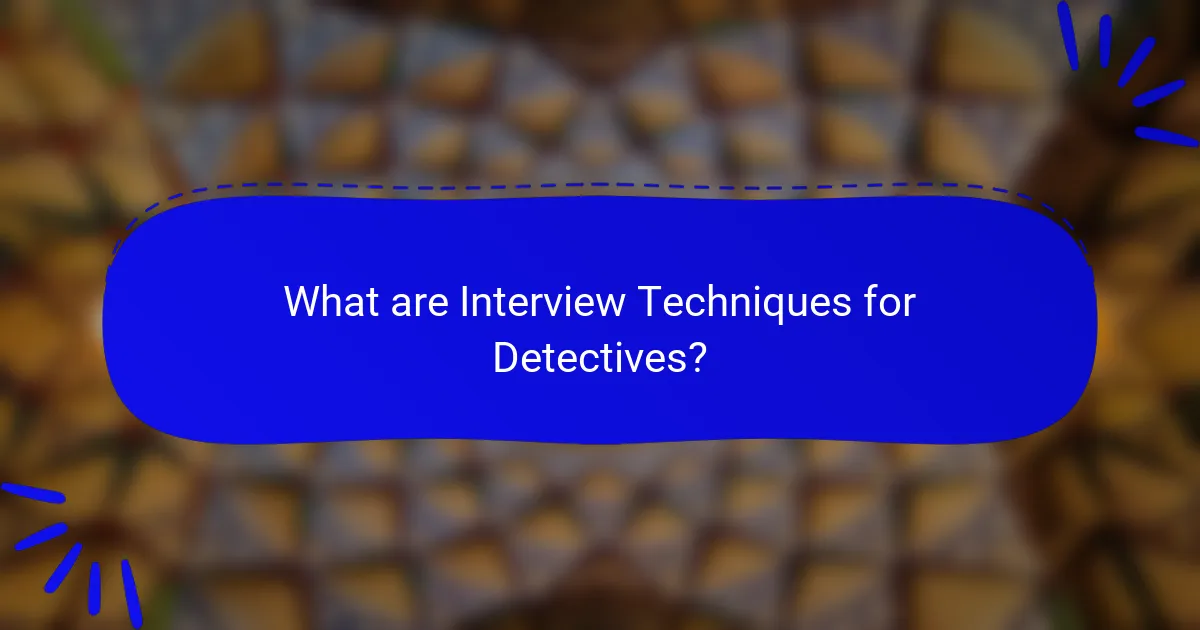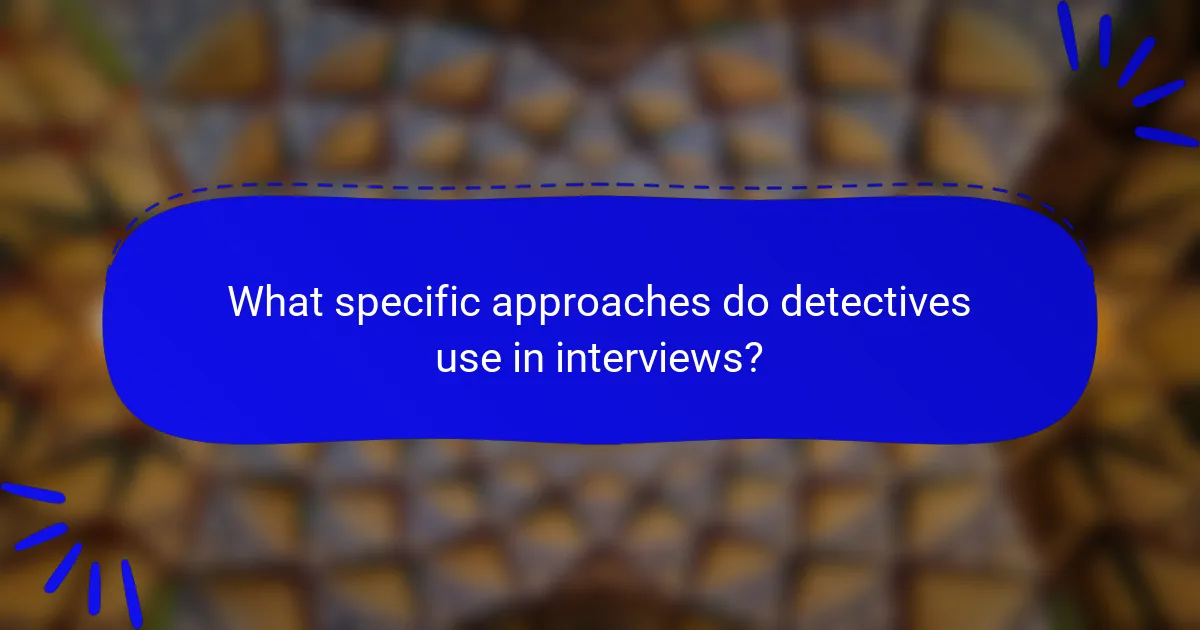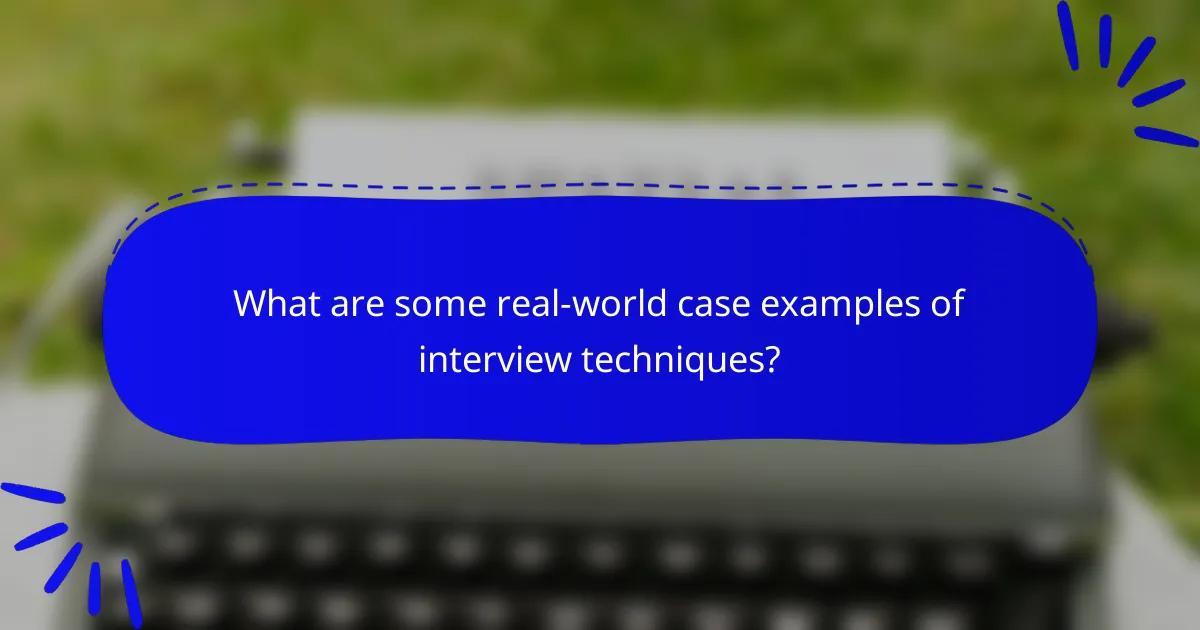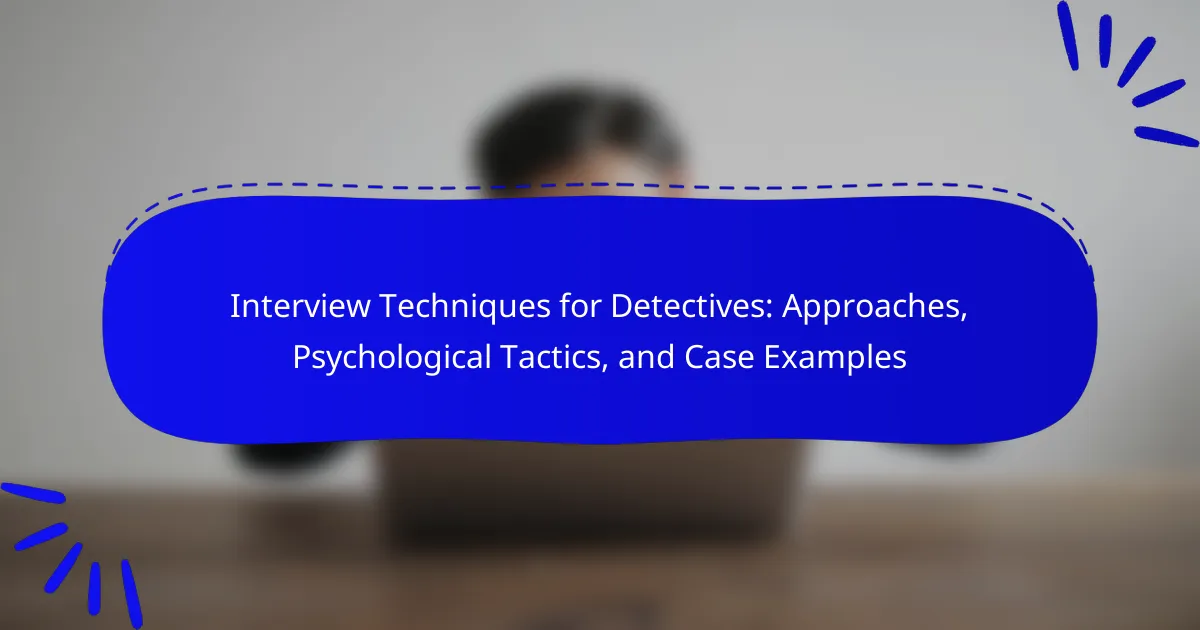
What are Interview Techniques for Detectives?
Interview techniques for detectives include rapport building, active listening, and strategic questioning. Rapport building helps establish trust with the interviewee. Active listening ensures that detectives fully understand the responses given. Strategic questioning involves open-ended questions to gather detailed information. Detectives may use the cognitive interview technique to enhance memory recall. This technique encourages witnesses to recount events in various orders. Detectives also employ the Reid technique, which focuses on behavior analysis during interviews. Each approach aims to elicit truthful information and assess credibility. These techniques are supported by psychological principles and studies in investigative interviewing.
How do interview techniques impact detective work?
Interview techniques significantly impact detective work by influencing the quality and accuracy of information gathered. Effective techniques can lead to clearer testimonies and more reliable evidence. For instance, the use of open-ended questions encourages witnesses to provide detailed accounts. This method has been shown to yield more comprehensive information than closed questions. Research indicates that skilled interviewers can increase the amount of relevant information obtained by up to 50%. Additionally, employing psychological tactics, such as building rapport, can enhance cooperation from suspects and witnesses. A study by the National Institute of Justice found that rapport-building techniques improve the likelihood of obtaining truthful information. Thus, the strategic application of interview techniques is crucial for successful detective investigations.
What are the foundational principles of effective interviewing?
The foundational principles of effective interviewing include preparation, rapport building, active listening, and clear questioning. Preparation involves understanding the case details and formulating relevant questions. Rapport building helps establish trust, making interviewees more comfortable to share information. Active listening ensures that the interviewer fully comprehends responses and can follow up appropriately. Clear questioning focuses on asking straightforward and unambiguous questions to elicit accurate information. These principles are supported by research indicating that interviews conducted with these strategies yield more reliable and comprehensive responses.
How do different interview techniques vary in application?
Different interview techniques vary in application based on their purpose and context. For instance, structured interviews follow a set format, ensuring consistency across interviews. Unstructured interviews allow for flexibility, enabling interviewers to explore topics in depth. Behavioral interviews focus on past experiences to predict future behavior. Cognitive interviews aim to enhance memory recall through specific questioning techniques. Each technique has unique methodologies suited for various investigative scenarios. For example, cognitive interviews have been shown to improve the accuracy of eyewitness testimonies by up to 35% (Fisher et al., 1987). Understanding these differences helps detectives choose the most effective approach for their specific case.
Why are psychological tactics important in interviews?
Psychological tactics are important in interviews because they enhance information gathering. They help interviewers establish rapport with subjects. This connection can lead to more open communication. Effective psychological tactics can also help in assessing the truthfulness of responses. Techniques such as mirroring and active listening encourage subjects to share more. Research indicates that skilled interviewers can increase the accuracy of information obtained. For example, studies show that rapport-building techniques improve recall by up to 50%. Understanding psychological principles allows detectives to adapt their approach based on the subject’s behavior.
What psychological principles can enhance interviewing success?
Cognitive psychology principles can enhance interviewing success. Understanding cognitive biases helps interviewers shape questions effectively. For instance, the confirmation bias can lead interviewers to focus on information that supports their assumptions. By being aware of this, interviewers can ask open-ended questions to gather a broader range of information. Additionally, the principle of reciprocity can create a more cooperative atmosphere. When interviewers build rapport, subjects are more likely to share information. Research shows that a positive emotional state can improve recall accuracy. Techniques such as mirroring body language can foster trust and openness. Overall, applying these psychological principles can significantly improve the effectiveness of interviews.
How do psychological tactics influence suspect behavior?
Psychological tactics significantly influence suspect behavior during interviews. These tactics can manipulate emotions and perceptions, leading to compliance or confession. Techniques such as building rapport can create a sense of trust. This may encourage suspects to disclose information they would otherwise withhold. Conversely, confrontational tactics can induce stress, prompting defensive behavior. Research indicates that high-stress environments can lead to increased errors in judgment. For example, a study by Kassin et al. (2010) found that suspects under pressure are more likely to confess falsely. Overall, psychological tactics shape the dynamics of suspect interactions, affecting their responses and decisions.
What role does body language play in detective interviews?
Body language plays a crucial role in detective interviews. It provides non-verbal cues that can indicate truthfulness or deception. Detectives observe gestures, [censured] expressions, and posture to assess a subject’s emotional state. For instance, crossed arms may suggest defensiveness, while eye contact can indicate confidence. Studies show that 55% of communication is non-verbal, emphasizing its importance. Detectives trained in body language can better interpret these signals. This understanding aids in building rapport and extracting information effectively. Overall, body language significantly enhances the investigative process in interviews.
How can detectives interpret non-verbal cues effectively?
Detectives can interpret non-verbal cues effectively by observing body language, [censured] expressions, and gestures. These non-verbal signals often reveal emotions and intentions that words may not convey. For instance, crossed arms may indicate defensiveness, while consistent eye contact can suggest honesty. Detectives should also consider context, as cultural differences can influence non-verbal communication. Research indicates that around 55% of communication is non-verbal, underscoring its importance in interviews. By combining verbal and non-verbal analysis, detectives can gain a deeper understanding of a subject’s truthfulness and state of mind.
What are common body language indicators of deception?
Common body language indicators of deception include avoiding eye contact, fidgeting, and inconsistent [censured] expressions. Individuals may look away frequently when lying, as they struggle to maintain eye contact. Fidgeting can manifest as tapping fingers or shifting in their seat, indicating discomfort. Inconsistent [censured] expressions may occur, where the emotions displayed do not match the verbal message. Research shows that micro-expressions can reveal true feelings, often contradicting spoken words. Additionally, closed body language, such as crossed arms, may suggest defensiveness or withholding information. These indicators, while not definitive, are often associated with deceptive behavior.

What specific approaches do detectives use in interviews?
Detectives use several specific approaches in interviews to gather information effectively. These approaches include the cognitive interview technique, which focuses on enhancing memory retrieval. Detectives also employ the Reid technique, emphasizing psychological manipulation to elicit confessions. Additionally, they utilize rapport-building strategies to create a comfortable atmosphere for interviewees.
Another approach is the use of open-ended questions, allowing subjects to provide detailed responses. Detectives may also analyze body language and non-verbal cues during interviews. They often conduct pre-interview research to understand the subject’s background. This preparation helps frame questions that are relevant and targeted.
Finally, detectives may apply strategic pauses to encourage interviewees to fill silence with information. These methods are grounded in psychological principles and have been shown to improve the accuracy of information gathered during interviews.
How do detectives prepare for interviews?
Detectives prepare for interviews by conducting thorough background research on the interviewee. This includes reviewing case files, previous statements, and relevant evidence. They also plan the structure of the interview, deciding on key questions to ask. Detectives often practice their questioning techniques to ensure clarity and effectiveness. They consider the psychological state of the interviewee, preparing to build rapport. Additionally, detectives ensure that the interview environment is conducive to open communication. They may also consult with colleagues for insights on the case. This preparation enhances the likelihood of obtaining accurate and useful information during the interview.
What research methods assist in interview preparation?
Qualitative research methods assist in interview preparation. These methods include literature reviews, case studies, and observational studies. Literature reviews provide insights into previous interview techniques and outcomes. Case studies offer real-life examples of successful interview strategies. Observational studies allow detectives to analyze interactions in similar contexts. These methods enhance understanding of effective interviewing. They also inform the development of tailored questions and approaches. Collectively, they improve the overall effectiveness of the interview process.
How does case context influence interview strategy?
Case context significantly influences interview strategy by shaping the approach and techniques used during the interview process. Different types of cases, such as violent crimes or white-collar offenses, require tailored strategies to elicit accurate information. For instance, in high-stakes cases, detectives may employ more psychological tactics to build rapport and encourage cooperation. Conversely, in less severe cases, a straightforward questioning technique may suffice.
The context also dictates the urgency and pressure of the interview, affecting the tone and pace. A rapidly evolving case may necessitate a more aggressive strategy to obtain quick answers. Additionally, the background of the interviewee, such as their relationship to the case, can influence the type of questions asked.
Empirical studies in criminal psychology support these approaches, showing that context-aware interviewing leads to higher rates of obtaining reliable information. For example, research by the National Institute of Justice indicates that interviews tailored to the specifics of the case yield better results than generic questioning.
What types of questioning techniques are utilized?
Detectives utilize various questioning techniques during interviews to gather information effectively. Common techniques include open-ended questions, which encourage detailed responses. Closed-ended questions are used for specific answers, often yes or no. Probing questions delve deeper into a topic, seeking clarification or additional details. Leading questions suggest a particular answer, guiding the interviewee’s response. Hypothetical questions explore potential scenarios to assess reactions. These techniques are supported by research in investigative psychology, highlighting their effectiveness in eliciting truthful information.
How do open-ended questions facilitate information gathering?
Open-ended questions facilitate information gathering by encouraging detailed responses. They allow interviewees to express their thoughts freely. This can lead to richer, more nuanced information. Unlike closed questions, open-ended questions do not limit answers to “yes” or “no.” They prompt individuals to elaborate on their experiences and feelings. Research indicates that open-ended questions can reveal insights that may not surface otherwise. For example, a study by the National Institute of Justice found that open-ended prompts yield more comprehensive narratives in interviews. This technique enhances the depth of understanding in investigative contexts.
What is the significance of closed-ended questions in interviews?
Closed-ended questions in interviews are significant because they elicit specific, concise responses. These questions typically require a yes or no answer or a choice from predefined options. They help interviewers gather clear and quantifiable data. This format minimizes ambiguity and allows for easier comparison of responses. Closed-ended questions can also keep the interview focused and on track. Research shows that using closed-ended questions can improve the efficiency of information gathering. They are particularly useful in high-stakes situations where clarity is essential. Overall, their structured nature aids in effective decision-making during interviews.
What are the best practices for conducting interviews?
The best practices for conducting interviews include thorough preparation, establishing rapport, asking open-ended questions, and active listening. Preparation involves understanding the case details and formulating relevant questions. Establishing rapport helps the interviewee feel comfortable and willing to share information. Open-ended questions encourage detailed responses, allowing for deeper insights. Active listening ensures that the interviewer fully comprehends the interviewee’s answers and can ask follow-up questions effectively. These practices enhance the quality of information gathered during the interview process.
How can detectives build rapport with interviewees?
Detectives can build rapport with interviewees by establishing trust and demonstrating empathy. They should use active listening techniques to show genuine interest in the interviewee’s perspective. This includes maintaining eye contact and nodding to acknowledge understanding. Detectives can also mirror the interviewee’s body language to create a sense of connection. Additionally, sharing personal anecdotes can help humanize the interaction and make the interviewee feel more comfortable. Asking open-ended questions encourages the interviewee to share more information. Creating a non-threatening environment further supports rapport-building. Research indicates that a positive relationship can lead to more reliable information being shared during interviews.
What techniques help manage interviewee anxiety?
Techniques that help manage interviewee anxiety include creating a comfortable environment and establishing rapport. A relaxed setting can reduce stress levels. Using open body language fosters trust. Active listening assures the interviewee that their concerns are heard. Asking open-ended questions encourages dialogue and eases tension. Offering breaks during lengthy interviews helps maintain focus. Providing clear explanations of the interview process alleviates uncertainty. These techniques are supported by research indicating that a supportive atmosphere enhances communication effectiveness.

What are some real-world case examples of interview techniques?
Real-world case examples of interview techniques include the Reid Technique, which emphasizes behavioral analysis. This method was effectively used in the 1990s during the investigation of the murder of a 6-year-old girl in Colorado. Detectives observed the suspect’s body language and inconsistencies in his statements to elicit a confession.
Another example is the PEACE model, which stands for Preparation and Planning, Engage and Explain, Account, Closure, and Evaluate. This technique was utilized in the UK during the investigation of the 2005 London bombings. It focused on open-ended questioning and rapport building, leading to more reliable information from witnesses.
The Cognitive Interview technique is also noteworthy. It was developed to enhance recall among witnesses. In a study by Geiselman et al. (1985), this technique was shown to improve the amount and accuracy of information recalled compared to standard interview methods.
These examples illustrate the effectiveness of structured interviewing techniques in real-world investigations.
How have successful interviews led to case breakthroughs?
Successful interviews have led to case breakthroughs by uncovering critical information. Detectives often utilize strategic questioning techniques to elicit details from witnesses or suspects. These techniques can reveal inconsistencies in stories or new leads. For example, a well-structured interview may prompt a suspect to disclose previously hidden evidence. Studies show that open-ended questions increase the likelihood of obtaining useful information. Additionally, rapport-building techniques can encourage subjects to share more freely. In high-profile cases, successful interviews have directly resulted in arrests and convictions. Such breakthroughs underscore the importance of effective interview techniques in criminal investigations.
What lessons can be learned from high-profile cases?
High-profile cases provide critical insights into effective interview techniques. They highlight the importance of establishing rapport with subjects. Building trust can lead to more open communication. Additionally, these cases illustrate the need for careful preparation and research. Understanding the background of the subject can inform questioning strategies. They also demonstrate the impact of psychological tactics on eliciting information. Techniques such as cognitive interviewing can enhance recall accuracy. Finally, high-profile cases emphasize the necessity of ethical considerations during interviews. Maintaining integrity can influence public perception and case outcomes.
How do case outcomes demonstrate the effectiveness of specific techniques?
Case outcomes demonstrate the effectiveness of specific techniques through measurable results in investigations. Successful interviews often lead to confessions or critical information that aids in solving cases. For example, the Reid Technique has shown a higher rate of obtaining confessions in various studies. Research indicates that cases employing this technique resulted in a 73% confession rate compared to 50% with less structured approaches. Additionally, case studies reveal that detectives using rapport-building techniques report improved cooperation from suspects. These outcomes validate the effectiveness of tailored interview strategies in criminal investigations.
What are common challenges detectives face during interviews?
Detectives face several common challenges during interviews. One major challenge is obtaining truthful information from interviewees. Many individuals may be uncooperative or deceptive. Detectives often encounter emotional reactions that can hinder communication. Additionally, witnesses or suspects may have memory lapses, affecting the reliability of their statements. Detectives also deal with varying levels of cooperation based on the interviewee’s background. Time constraints can pressure detectives to gather information quickly. Furthermore, the presence of legal counsel can complicate the interview process. These challenges require detectives to employ effective techniques to navigate complex interactions.
How can detectives overcome resistance from interviewees?
Detectives can overcome resistance from interviewees by establishing rapport. Building trust encourages interviewees to feel safe sharing information. Detectives should use active listening techniques to show empathy and understanding. Open-ended questions can facilitate dialogue and reduce defensiveness. Providing clear explanations about the interview process can also help. Detectives should avoid confrontation and instead adopt a collaborative approach. Research indicates that rapport-building significantly increases the likelihood of obtaining valuable information. A study by the International Association of Chiefs of Police found that effective communication strategies enhance interview outcomes.
What strategies help handle emotionally charged situations?
Active listening is a key strategy to handle emotionally charged situations. This involves fully concentrating on the speaker, understanding their message, and responding thoughtfully. It helps to validate the emotions of the person involved. Maintaining a calm demeanor is also crucial. A composed presence can diffuse tension and create a safe environment for dialogue.
Using open-ended questions encourages the other person to express their feelings. This approach fosters communication and allows for a deeper understanding of the situation. Empathy is essential; showing genuine concern can build rapport and trust.
Setting boundaries can help manage the emotional intensity. Clearly stating what is acceptable behavior can prevent escalation. Lastly, taking breaks when necessary allows all parties to cool down and reassess the situation. These strategies are effective in maintaining control and promoting constructive conversations during emotionally charged encounters.
What practical tips can enhance interviewing skills for detectives?
Detectives can enhance their interviewing skills by practicing active listening. This involves fully concentrating on the interviewee’s words and responding appropriately. Detectives should also ask open-ended questions to encourage detailed responses. This technique allows the interviewee to provide more context and information. Building rapport is crucial; establishing trust can lead to more honest answers. Detectives should observe non-verbal cues, as body language can reveal inconsistencies. Additionally, taking notes during interviews helps in recalling important details later. Regular training on psychological tactics can improve overall effectiveness. Finally, reviewing past interviews can identify areas for improvement and refine techniques.
The main entity of the article is “Interview Techniques for Detectives.” This article provides a comprehensive overview of various interviewing methods used by detectives, including rapport building, active listening, strategic questioning, and psychological tactics. It discusses the impact of these techniques on information accuracy, the significance of body language, and the importance of preparation in interviews. Additionally, real-world case examples illustrate the effectiveness of specific approaches, while challenges faced during interviews and strategies to overcome them are also examined. The article emphasizes the critical role of effective interviewing in successful detective work.
